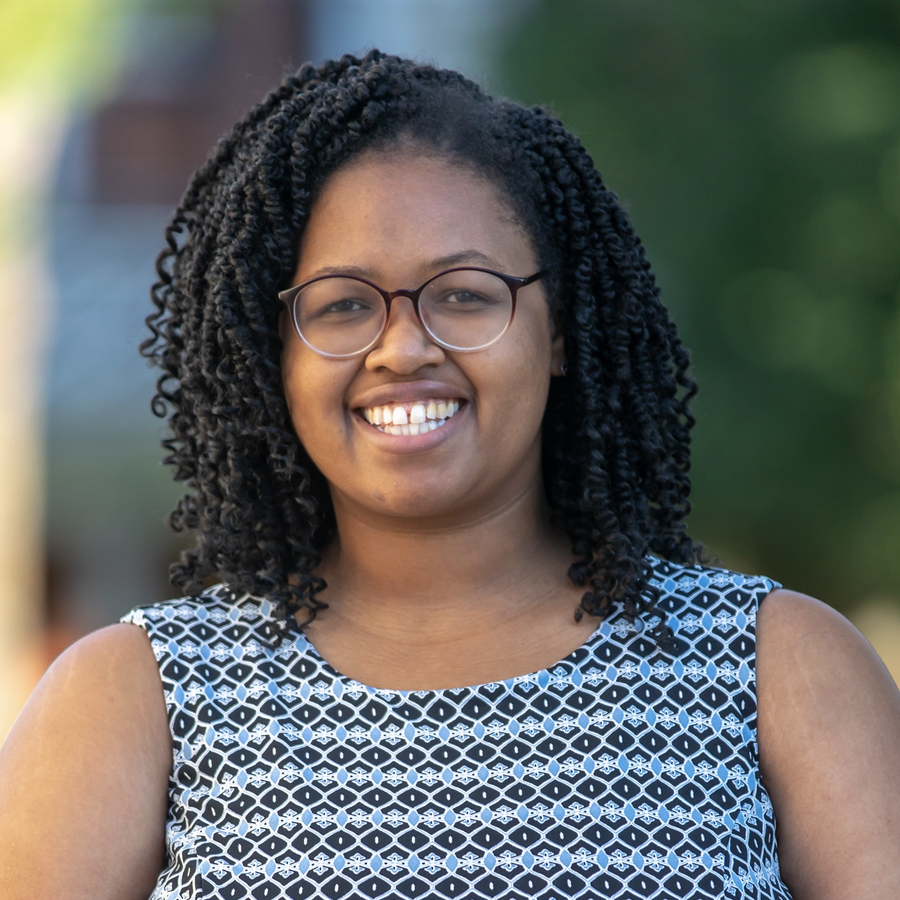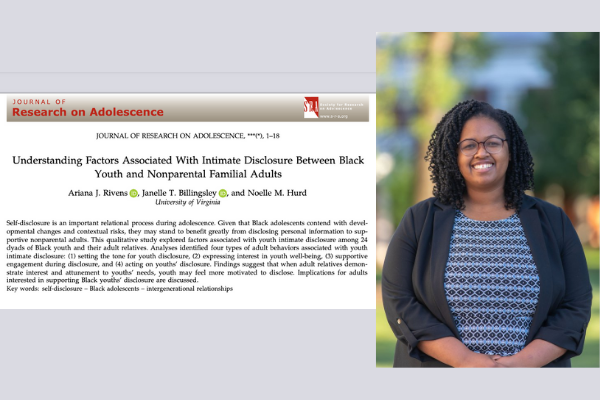By: Ariana Rivens
Highlights:
- Youth-Nex researchers Ariana J. Rivens, Janelle T. Billingsley, and Dr. Noelle M. Hurd publish new work on “Understanding Factors Associated With Intimate Disclosure Between Black Youth and Nonparental Familial Adults.”
- This article examines youth intimate disclosure to non-parental adult relatives among Black youth and outlines implications for adults looking to support Black youths’ disclosure.
- Included here are parts of a Q&A with graduate student Ariana Rivens from the Society for Research on Adolescence (SRA) as part of their must read Monday series.
Question: What would you say is the main takeaway from your article?
Rivens: I would say the main takeaway is about non-parental adult relatives and how intentional they are about making space for youth in their lives to disclose. Not only making space, but also staying engaged throughout the disclosure process. The paper describes how these adults encouraged youth to share by creating a positive atmosphere, being really supportive when youth were disclosing, and then, afterwards, taking steps to honor youth disclosing by validating them, giving them advice, and advocating for them. That’s the biggest takeaway—adult relatives play an active role in the process.
Question: You talk about reciprocity and how people may be more willing to share their thoughts and feelings with others who also reveal personal information about themselves. Is this the case in relationships between youths and trusted non-parental adults as well, or is this something that occurs more so between youths and their peers?
Rivens: Yes! In our study, both youth and non-parental adult relatives talked about times when the adults self-disclosed to the adolescent and participated in reciprocal sharing. This was really interesting to us, because adult disclosures were typically age-appropriate and relevant to what youth were sharing. When asked, relatives also talked about being really intentional about making sure that what they shared had the maximum positive impact on youth. They weren’t overburdening the youth by asking them for emotional support or looking to them for advice. It was more along the lines of: “You brought up a topic, so here’s a time that I’ve experienced it growing up” or “Here’s how I’m experiencing it right now as an adult”. It really speaks to what we believe—and research suggests—is one of the key reasons why having non-parental adults in youths’ lives is so helpful. It’s because they can pull on that lived experience and wisdom and can also share how they currently navigate situations. These adult relatives do that not by minimizing what kids are going through, but by emphasizing how this might be something that happens throughout life.
Question: The findings from this study are also incredibly powerful when put into the context of prior research, which, as you mentioned, suggests Black youths’ relationships with natural mentors may be protective of psychological distress associated with racial discrimination. Do you think that youths who lack such relationships face the risk of greater vulnerability to racial discrimination?
Rivens: Previous research suggests adults can be really helpful when youth are experiencing all types of marginalization. We’re focusing on racial discrimination and the effects of racism in this study, but these relationships could be really helpful for other marginalized groups such as LGBTQ youth who might be experiencing rejection or difficulties with their parents. Having a family member or another adult outside act as a buffer against these negative effects from interpersonal issues as well as the more systemic ones. To answer your question more specifically: yes, we know that these supportive relationships have buffering effects against the impact of racism, and we know that youth who experience racism-related stressors in our world and don’t have supportive connections that they can turn to process the event, get support, and to be reminded how important and valued they are, are more likely to feel isolated. While supportive relationships are so important and a rich resource, though, the cumulative adverse impacts of things like racism and other structural inequalities aren’t really offset by having these supportive relationships—that’s not going to solve it all. Even the most supported Black child is at risk for some adverse outcomes based on these issues, so, regardless of their mentor status and whether or not they have these relationships, youth are going to benefit from the dismantling of racism and other inequitable systems.
For more from this Q&A, please see the SRA blog. For more on these research findings, please see the Journal for Research on Adolescence article entitled “Understanding Factors Associated With Intimate Disclosure Between Black Youth and Nonparental Familial Adults.”
If you have any comments or questions about this post, please email Youth-Nex@virginia.edu. Please visit the Youth-Nex Homepage for up to date information about the work happening at the center.

Author Bio: Ariana Rivens (she/her/hers) is a clinical psychology PhD student in the Promoting Healthy Adolescent Development (PHAD) Lab at the University of Virginia. Her clinical and research interests include the mental health of Black youth and emerging adults, supportive intergenerational relationships, and positive institutional climates within higher education
